Creating sustainable smartphones

© Unsplash
Smartphones and mobile communications technology have great potential to drive sustainable development forward through the use of smartphone applications and other technologies. Increased production and consumption of smartphones have major social and environmental impacts. With several partners SYKE identified and published a comprehensive set of good and scalable practices that have the potential to contribute to more sustainable production, consumption and end-of-life of smartphones. In addition, SYKE is focusing on a procurement-led strategy to accelerate market pull towards a more sustainable life cycle of smartphones.
In co-operation
ICT companies, research partners, citizens.
Read more:
Bringing nature conservation into the construction industry
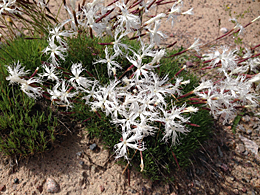
© Minna Pekkonen
New practices adopted within the construction industry have led to considerable improvements. Finland’s construction sector has now got a clearer picture of its impacts on nature, and is actively looking for new solutions to reduce harmful impacts. SYKE has helped Finnish construction businesses to work more sustainably, and results from trials have been promising with regard to the consequent conservation of biodiversity.
In co-operation
Construction companies
Read more:
Less noise from activities of shipping companies in the Baltic Sea
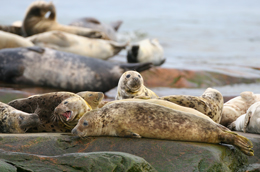
© Antti Below
Noise of human origin is expected to increase in marine areas. Underwater noise can cause serious harm to sea mammals and fish, including disturbances in communication, changes in behaviour, and even physical damage. SYKE has participated in the production of the noise maps for the entire Baltic Sea area and a set of guidelines for measuring and controlling the level of noise. Instructions by IMO for abatement of ship noise have been implemented by all shipping companies in the Baltic Sea. SYKE and the Finnish Transport Safety Agency Trafi have participated in the production of the instructions. Noise is also reduced through sea area planning, the assessment of projects for environmental impact, and measures for the protection of marine areas.
In co-operation
Trafi, shipping companies of the Baltic Sea, partners of BIAS project
Read more:
More attention to natural values in forest planning
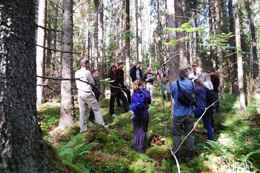
© Jussi Palmen
Alongside their partners, SYKE and Parks & Wildlife Finland have used the Zonation software to evaluate the nature conservation value of Finnish forests – representing the first such exercise done on a nationwide basis. The results of the work will enable forest professionals to take better account of natural values in forest planning.
In addition, land-use planners will be able to take account of the costs of different alternatives for promoting biodiversity. Voluntary protection resources can also be targeted more cost-effectively, including in the METSO programme, by using the results provided by the Zonation software, which was developed by the University of Helsinki.
In co-operation:
Metsähallitus, Finnish Forestry Center, Forest Development Centre Tapio, ELY Centres, University of Jyväskylä, Natural Resources Institute Finland, University of Helsinki
Read more:
Reindeer owners’ associations produce geographical information services
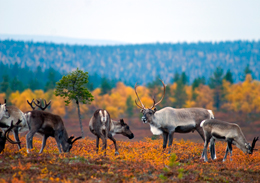
© Pentti Sormunen
Reindeer herding pasture areas are also valuable to forestry, energy production and tourism. Reindeer owners’ associations use the Poro-Harava tool to produce geographical information services to support land-use planning, including information on the location of pastures and transport routes. Thus the tool and operating model, designed by SYKE alongside its partners, help to reconcile reindeer herding with other land use goals.
Materials produced by reindeer owners’ associations have been used in applications such as the preparation of Kuusamo's master plan, the regional land use plans of Rovaniemi and Eastern Lapland, and master plans for wind power. In addition, dialogue has been promoted between the various parties involved in land use planning.
In co-operation:
Natural Resources Institute Finland, Lapland University of Applied Sciences (Lapin AMK), Regional Council of Lapland, Regional Council of Kainuu, Council of Oulu Region, Ministry of the Environment, ELY-Centres of Lapland, Kainuu and North Ostrobothnia, Reindeer Herders' Association, Reindeer herding cooperatives, The Sámi Education Institute (SAKK), Metsähallitus, Ramboll Oy, Pöyry Finland Oy, Sweco Ympäristö Oy
Read more:
Fish farms in the Archipelago Sea are directed to the least sensitive sea areas
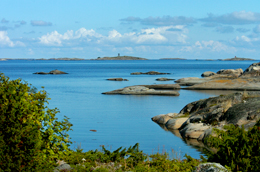
© Riku Lumiaro
SYKE surveyed the area impacted by the nutrients from a large fish farm located in the northern part of the Archipelago Sea. SYKE used modelling to study the movements and dilution of the nutrient load in the sea area. Thanks to this work fish farms and other large installations with emissions into the sea can be directed to less sensitive coastal areas already in the planning stages.
Read more:
Development of Archipelago Sea nutrient load model assembly and its implementation to coastal Gulf of Finland and Bothnian Sea
Companies reduce their carbon footprint

© UNSPLASH
Companies seeking a competitive edge from climate-friendly products and services need information on the possibilities of reducing climate emissions. Companies have found ways to reduce the carbon footprint of their products and services in LCA clinics. SYKE has implemented these clinics alongside SMEs based in the municipalities of North Karelia. Companies have also boosted climate-friendly supply and demand.
Alongside companies and decision-makers, SYKE has also performed carbon footprint assessments based on life cycle evaluations. The results of these assessments have been made public.
Read more:
Companies weighing up their impacts on nature
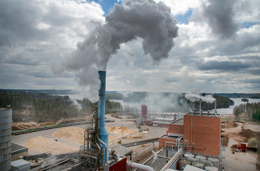
© Riku Lumiaro
Several companies have decided to reduce their adverse impacts on nature, thanks to Master Class training, which has improved their ability to identify and mitigate adverse effects. At the same time, companies have identified the dependence of their businesses on natural ecosystem services.
As many as 40 companies have attended the training, which was innovated, planned and implemented by SYKE alongside FIBS, Finland’s leading corporate responsibility network, in 2014–2017. SYKE has also implemented innovative environmental projects alongside the trained companies. They represent a range of business sectors, including transport, energy, industry, trade, finance and services.
In co-operation:
FIBS (corporate responsibility network), companies
Read more:
Car sharing as a part of sustainable mobility
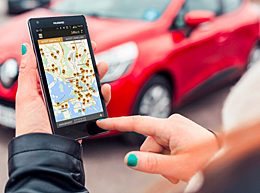
© 24Rent
Car sharing is an example of novel services promoting sustainable mobility in cities. The location of shared cars has significant impact when the goal is to increase their use. Car sharing service 24Rent and SYKE identified new areas for most potential for car sharing operations in Tampere and Helsinki in order to increase take-up of the service. For this purpose, information about car usage, social structure and practical experiences of operators were also combined.
In co-operation:
24Rent, University of Tampere
Read more:
DAC – Dwellers in Agile Cities project